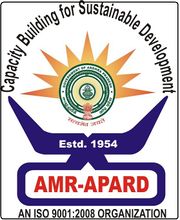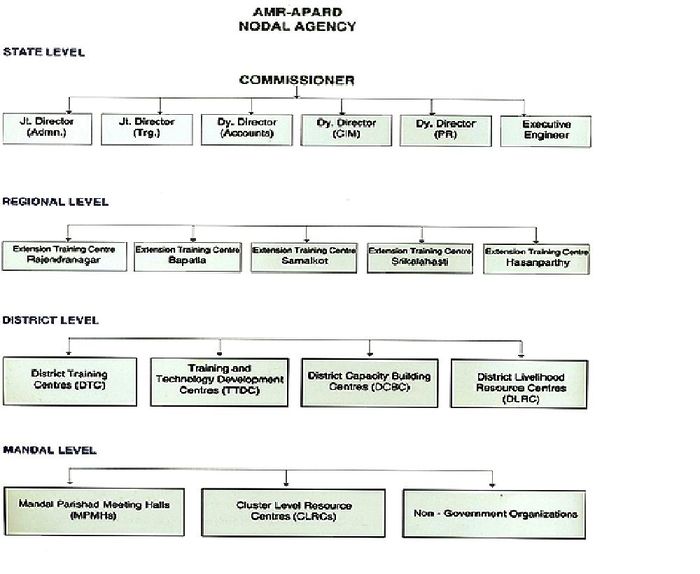Apard
AMR-Andhra Pradesh Academy of Rural Development
The Andhra Pradesh Academy of Rural Development (APARD) has been working relentlessly for over 54 years now in building capacities for sustainable development of the rural poor. APARD is the apex training institute in AP for capacity building of rural development officers and panchayat raj officials. We also consistently focus on research that helps us offer high quality consulting services in rural development.
Contents
About AMR-APARD
Profile
The AMR-Andhra Pradesh Academy of Rural Development (APARD), located in Hyderabad, Andhra Pradesh, India, has been working relentlessly in building capacities for sustainable development of the rural poor for over 54 years now.
It is the apex training institute in Andhra Pradesh for Rural Development officers and Panchayat Raj (Rural Administration) elected representatives and functionaries. The institute caters to the capacity building requirements of around 2.61 lakh elected representatives of Panchayat Raj (Rural Administration) Institutions and around 50 thousand officials from rural development department. The Academy also extends its capacity building services to various other government departments.
We also consistently focus on research that helps us offer high quality consulting services in rural development.
The academy also has a consistent focus on research and innovation in rural development, it undertakes need-driven research and evaluation studies as part of its own operations strategy and also for other organizations and agencies working in the field rural development.
With in-depth understanding of rural conditions, problems and opportunities, and its extensive experience working with rural communities, APARD also provide high quality development consulting and project management services in rural development to government and leading national and international clients.
With an aim to generate efficient and high quality manpower working towards the cause of rural development, APARD has now forayed into education services by offering comprehensive educational courses in Rural development.
This Academy extends its presence to other regions through its 5 extension training centres at Rajendra Nagar, Hasanparthi, Kalahasthi, Bapatla and Samalkot. APARD also has its outreach centres at District level (District Livelihood Resource Centres) and CLRCs (Cluster level resource centres) at Mandal Level. To further strengthen its network, APARD will be adding more centres in other regions for greater impact, enhanced reach and more efficient service delivery to the rural poor.
The Institution was started in the year 1954 as "Development Officers Training Centre" by Ministry of Community Development and Cooperation, Government of India. The Institute has gone through several evolutions and is presently called as the AMR - APARD since 2002. The centre has 10 multi-disiplinary centers working on diverse areas in rural development and a registered society called the Centre for Development Studies.
APARD has 8 dedicated work centres focusing on striving towards strengthening natural resource management, environment & disaster management, women & child Welfare, Land administration for the poor, human resource management, eGovernance, social empowerment and equity, and planning and administration in the rural regions.
Mission & Vision
Vision
- To transform this Academy as a Centre of Excellence in Panchayat Raj and Rural Development fields and emerge as a Deemed University
Mission
- To build the capacities of the functionaries of Panchayat Raj and Rural Development Departments for achieving sustainable development.
- To build the capacities of the Panchayat Raj Institutions to evolve as Institutions of Local Self Governments, through systematic training to the elected representatives and official functionaries working with PRIs
- To consistently focus on research, evaluation and consulting services to create enablers for rural development.
- Here is a video on the success story of GangaDevipally
- To offer various competent and extensive educational courses for those who want to pursue career in the field of Rural Development
Our Initiatives
AMR-APARD has initiated several measures to sensitise the people about the significance of Gramsabha through, cultural performances, wall posters, advertisements in TV/Print Media and organizing training programmes through SAPNET Mana TV channel. It is in that context that AMR – Andhra Pradesh Academy of Rural Development has brought out this booklet in the hope that it would be of use to all the Elected Representatives, Officials working with PRIs, NGOs and people interested and working towards the cause of strengthening PRIs in India.
Our Approach
capacityBuilding
Capacity Building Services A time tested multi-pronged approach is being adopted by APARD for several years, to reach the huge target of 2.61 Lakh elected representatives. Training is imparted through both Direct Mode and through Cascading modes. Distance Mode of Training through centrally located studio (located at Hyderabad) using Ku band Satellite transmission facility is being adopted to reach Village Level Functionaries of various departments. This approach helps us cover huge groups of targeted participants and also reduces costs.
Direct Training
Direct Training Programs are arranged for all key functionaries at APARD, 5 Extension Training Centres and at district levels. Direct training is imparted for a period of 3 to 6 days at APARD and ETCs.
Cascading Mode
Cascading Mode of Training is adopted for bigger groups like Ward Members and other grass root level functionaries. A system of identifying suitable trainers, who can handle training sessions are selected from NGOs, Retired Officials, former members of Mandal Parishad Presidents and other Panchayat Raj staff. These Trainers are subjected to rigorous training at APARD in using Participatory methodologies for training the elected representatives. Cascading Mode of training is imparted for a period of 2 to 3 days at mandal head quarters, where batches of 35-40 functionaries are organised. All our training programs are driven by the requirements of the people (rural poor) who have to be ultimately benefited.
Research and Consulting Services
Research and Consulting Services
- These initiatives respond to the needs, priorities, opportunities and constraints identified by poor rural people. Our research and consulting projects begin with an focus to understand requirements of the rural people and strive to achieve sustainable solutions to transform their lives. Our approach is to work at the grass root level keeping the rural poor people at the centre of all development plans and activities.
Education Services
Education Services:
- The approach adopted in our educational services is to focus on imparting skills that actively engage students in all aspects of the selected rural development domain developing competence to design and implement sustainable projects with effective tools and methods. The training is complimented with live project work that help students get on-the-ground experience understanding of the real issues of rural development.
Our Strength
- An Apex training institute in the field PR &RD run by Government since 1954
- A think tank for PR&RD Departments
- Eight Study Centres working towards strengthening PR, RD & Natural Resource Management, Disaster Management, Women & Child Welfare, Land and Poor, HRD, E-Governance, Social Empowerment and Equity
- Experienced faculty members having mastery in Design of Training Programmes
- Two centres are being headed by Sr IAS Officers (Retired) and another Centre by Sr Officer from A.P. Administrative Service.
- State of the art training infrastructure at State level, Regional Levels (ETC) and Reasonably good infrastructure at District Levels (DLRC) and sub district levels (CLRCs)
- Hyper Connectivity- Video conferencing facility with District Head Quarters, Extension Training Centres, National Informatics Centre
- Strong Networking with National and State Level institutions and organizations
- District Training cells for managing district level activities
- Over 1300 ToTs on Panchayat Raj Issue
- Satellite Connectivity for 1096 Mandals for organizing out reach trainings.
Milestones and Achievements
- Established in April 1954 as "Development Officers Training Centre" by Government of India, Ministry of Community Development, Panchayat Raj and Cooperation to impart training to Block Development Officers of Community Development Projects spreading all over India
- In the year 1958-59, the Institute was renamed as "Orientation & Study Centre".
- In April 1967, the management of Training Centre was transferred to the State Government by the Government of India.
- In the year 1970 the Institute was renamed as "State Institute of Community Development and Panchayat Raj".
- The institute's name was changed as State Institute of Rural Development in 1983
- In the year 1994, the Institute was renamed as "Andhra Pradesh Academy of Rural Development" and seven study centers were opened to cater to the emerging training needs as a consequence of 73rd and 74th Constitutional Amendments.
- In the year 1996 the Centre for Disaster Management was opened in A.P. Academy of Rural Development.
- The Extension Training centres were brought under the Administrative control of APARD in the year 1999
- The Centre for Development studies was established in the year 2000
- From 5-8-2002 onwards, this Academy is being known as "AMR-Andhra Pradesh Academy of Rural Development" in commemoration of the then PR &RD Minister Late Sri Aliminati Madhava Reddy.
- The Government of Andhra Pradesh (PR & RD Department) has accorded the status to the Academy as the Nodal Agency for training and capacity building in Panchayat Raj and Rural Development Department
- The Academy has celebrated it's Golden Jubilee year in 2004.
- Recognised as a Nodal Agency for organizing training programmes to the Revenue Officers in the State on Capacity Building by Chief Commissioner of Land Administration in 2005
- The AMR-APARD has been designated as Mother Organization for District Livelihood Resources Centres (DLRCs) and Cluster Livelihood Resources Centers (CLRCs)
- The Institute has entered an MoU with IRSA during 2007, Guntur for running long term certificate/Degree/Diploma courses in the field of Rural Development.
- The Institute has entered an MoU with Tata Institute of Social Sciences, Mumbai on 1st January 2009 for running various academic courses in the filed of Panchayat Raj and Rural Development.
- Video Conference facility established with all District Head Quarters, Extension Training Centres and National Informatics Centre for organing virtual classes.
Key People
- Mr. V. Vasant Kumar, Minister of Rural Development, IKP, Pensions & NREGP
- Mr. B. Satyanarayana,Minister of Panchayat Raj
- Mr. P. Viswarupu, Minister for Rural Water Supply
- Mr. R.Subramaniam, IAS,Principal Secretary,Rural Development
- Mr. M.V.P.C. Sastry, IAS, Principal Secretary, Panchayat Raj
- Ms. Chitra Ramachandran, IAS,Principal Secretary, Rural Water Supply
- Mr. Phani Kumar, IAS, Commissioner, AMR-APARD
- s. A. Shanthi Kumari, IAS, Commissioner, Rural Development
- Mr. K. Chandra Mouli, IAS, Commissioner, PR & RE
- Mr. K. Ambarish, IAS (Retd.), Senior Consultant, Land Cell
- Mr. M. Sebastian Raju, APAS (Retd.), Senior Consultant, Centre for Social Empowerment & Equity (CSEE)
- Mr. Mohd. Taqiuddin, Joint Director, Administration
- Mr. M. A. Kumar Raja, Deputy Director, Accounts
- Mr. N. Vijay Kumar, Administrative Officer
- Prof. R. Suryanarayana Reddy, Centre for Decentralised Planning & Administration (CDPA)
- Dr. C. Krishna Mohan Rao, Deputy Director, Centre for Research, Documentation & Training
- Dr. P. Raghunatha Reddy, Centre for Centre for Urban Studies
- K. Venkata Krishna, Deputy Director, ETC Cell
- Dr. E. V. Swarna Latha, Centre Head, Centre for Women and Child Development (CWCD)
- Brig D .V. Rao, Centre Head, Centre for Management of Environment and Disaster (CMED)
- Mr. B. Venkateswara Rao, Consultant, Land Cell
- V.N.V.K Satstry, Center Head, Media & Publication Cell
- Mr. H. Kurma Rao, Centre Head, Centre for Natural Resources Management (CNRM)

















